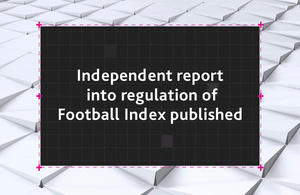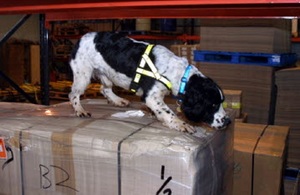Government publishes independent report into regulation of Football Index
Press release
An independent report into the regulation of BetIndex, the providers of the novel product Football Index which collapsed earlier this year, has been published.

- Gambling Commission has updated how it assesses risk so that novel products are properly considered
- Gambling Commission and Financial Conduct Authority have developed a strengthened Memorandum of * Understanding to improve cooperation in wake of review
- Review finds Gambling Commission could have worked faster to better regulate Football Index product
- Review’s findings will feed directly into Government’s ongoing review of the Gambling Act
A review was announced by the Government in April 2021 to examine in detail the actions taken by the Gambling Commission in the period from September 2015 up to the suspension of BetIndex’s licence in March this year. It has been led by Malcolm Sheehan QC.
The Gambling Commission is also carrying out a separate regulatory investigation into BetIndex Ltd on which it will report in due course, and has referred the case to the Insolvency Service. Administration proceedings for BetIndex Ltd are also ongoing which are looking at the assets and liabilities of the firm and will likely result in some reimbursement to creditors.
While Football Index was never regulated by the Financial Conduct Authority (FCA), the review also looked at how it worked with the Gambling Commission during this period and how it considered whether Football Index should also be regulated under financial services legislation.
It found that:
- In the first instance, BetIndex did not properly notify the Gambling Commission of the nature of the product in its licence application, nor did it inform the regulator of changes to the product after launch as it was required to.
- The Gambling Commission could have better responded to the challenges that the novel product raised once launched, with earlier scrutiny, including of the language used by the product, quicker decision-making and action, and better escalation of issues.
- While Football Index was never regulated by the FCA, areas for improvement for the FCA have been identified, including in speed of response to requests from the Commission and consistency of messaging on regulatory responsibilities.
The report identifies lessons to be learnt and provides recommendations for both the Gambling Commission and the FCA, which they have already started responding to, and provides valuable insights which will inform the Government’s ongoing review of the Gambling Act.
Gambling Minister Chris Philp said:
I’m extremely conscious of how devastating the collapse of Football Index has been on its many customers, which is why we moved quickly to launch this independent review.
We have been clear that we must learn lessons to make sure a situation like this does not happen again. I’m encouraged to see the Gambling Commission and the FCA are taking concrete steps on an action plan on how they will better work together.
We will ensure that the findings from this review feed directly into our ongoing Gambling Act Review which is looking at ways we can improve regulation of the gambling industry.
In light of the independent review, the Gambling Commission and the FCA are already taking steps to improve ways of working going forward:
- They have developed a strengthened Memorandum of Understanding, which includes new escalation routes to make sure regulatory impasses are identified and overcome quickly.
- The Gambling Commision has updated its framework for how it assesses risk so that product novelty is properly considered, as well as committing to consulting on tighter rules for the terminology used to describe gambling products. This includes making clear distinctions for consumers where products are gambling, rather than ‘investments’.
- The FCA has additionally nominated an Executive Director to oversee the relationship with the Commission, and continue to pursue its programme of change as set out in its July Business Plan.
In addition, the report asks whether more should be done to assure that gambling companies which offer long term bets are able to cover the payouts. This question will be considered as part of the Government’s Gambling White Paper, which it intends to publish in due course.
ENDS
Notes to editors:
- The Independent Review of the Regulation of BetIndex report can be found here.
- The Gambling Act Review Call for Evidence closed on 31 March.
- Football Index, operated by BetIndex Ltd, had a model that allowed customers to bet by buying ‘shares’ in footballers and receive returns based on their performance. The Gambling Commission suspended the firm’s operating licence in March, and it entered administration shortly after.
- In line with the Government’s manifesto commitment to review gambling legislation and ensure it is fit for the digital age, the Government will also look at the role and resources of the Gambling Commission as part of its Gambling Act Review and intends to publish a white paper in due course.
- BetIndex Ltd has been referred to the Insolvency Service by the Gambling Commission to ask that they consider whether the actions of the directors prior to administration breached insolvency or fraud laws. We are unable to comment on this matter further to avoid prejudicing any possible future legal proceedings.
- A Written Ministerial Statement has been laid in the House of Commons and a copy of the report will be deposited in the House of Commons Library.
Published 22 September 2021
